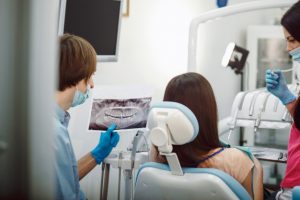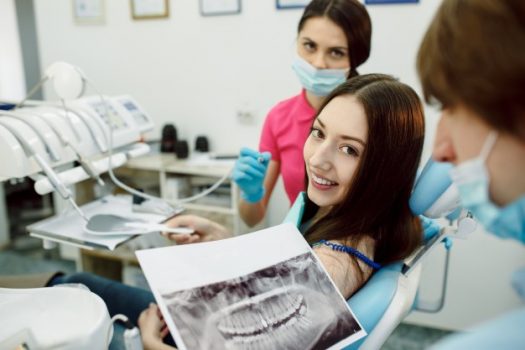Dental X-rays are also known as dental radiographs. These are the images of your teeth, bones and soft tissues around teeth. Dentists use these photos to assess your oral health. These X-rays capture the interior part of your teeth using low levels of radiation. Dental X-rays help the dentists to identify specific problems. The problems can be tooth cavities, tooth decay, etc.
Dental X-rays are just as necessary as dental cleanings. They seem complicated but are simple tools. X-ray pictures show images of cavities, wisdom teeth, and bone loss. Dental X-rays are performed preferably once a year or more often depending on what your dentist suggests you.

Why are Dental X-Rays Performed?
Dental X-rays are conducted to track the progress of any dental problem for a patient. These are performed based on the given factors:
- Age
- Oral health
- Oral disease
- Gum disease
- Tooth decay
If you’re a new patient, it is often recommended by the dentists to get x-rays done to assess your oral health. So the dentist gets a clear picture of your oral health. Children especially may need to have x-rays more often to let the dentist assess the growth of the adult teeth in children. X-rays help in monitoring such cases to prevent further complications due to the baby teeth.
Types of X-Rays
There are different types of x-rays which are classified based on the views of the mouth recorded. The types of x-rays are:
- Bitewing: This is used to check interdental cavities.
- Occlusal: It detects abnormalities in the teeth.
- Palatal: It captures all of your teeth at once.
- Panoramic: In this type of x-ray, the machine has to be rotated around your head. It is mostly used by the dentists to check wisdom teeth.
- Periapical: This type of x-ray checks from root to crown.
Risks of Dental X-Rays
Though the dental x-rays involve some amount of radiation, exposure levels are low, so they are considered safe for any age group. If digital x-rays are developed instead of developing them on film, the chances posing to risks are much lower. The dangers of damage caused by x-rays are lesser compared to the potential benefits.
Related Article: Cold Sores: Its causes, symptoms, prevention, and treatment
However, pregnancy stands as an exception to this. Women who are pregnant should avoid undergoing any types of x-rays in general. Certain X-rays are considered harmful to the developing fetuses.
Preparations for Dental X-Rays
There is no particular preparation needed for dental x-rays. But it is preferable to brush your teeth before going for your dentist appointment to create a healthy environment for the dentist working on your teeth. Dental cleanings are often followed by x-rays.
You are supposed to sit in a chair with a vest along your chest and lap. The x-ray machine is positioned on the head, and it records images of your mouth. Some dentists prefer a separate room for performing dental x-rays while some prefer conducting it in the same chamber where other dental procedures are carried on.
Result
Dental x-rays help your dentist to find problems with your teeth, mouth, and jaw. Once the x-rays are done, your dentist has a detailed report of your oral condition. Your dentist would be able to identify the abnormalities with the help of x-rays. If any defect is detected, treatment options can be discussed with the doctor.

In case of any abnormality in your teeth, bones, and jaw, the following can be noticed:
- Tooth decay
- Damage to the bones
- Dental injuries
- Tumors
- Abnormal tooth structures
Instances you can’t get X-rays Done
Reasons that create obstacles to Dental x-rays:
- If you have braces, dentures or such to your teeth, x-rays are not helpful.
- If you can’t hold x-ray plastic in your teeth, x-rays can’t be performed.
Palo Alto Dentist, Dr. Shadi Heidarian says, “Dental x-rays are apparently considered safe for every human including pregnant and breastfeeding women. However, certain precautions need to be followed. For pregnant and breastfeeding women especially, aprons must be placed on the body to protect the body from the radiations that emit out of the x-ray machine. Dentists must take proper and safe actions with pregnant women causing no harm to the woman and her fetus.”
Outlook
Just like following your daily dental procedures like brushing and flossing, x-rays are equally important to get it done. It is an integral part of your oral health. However, too regularly taking x-rays is not at all recommended. X-rays can be performed every one to two years, depending on your age, health, and insurance. Do not ever miss your appointments with your dentists if you face any pain or trouble in your teeth.
References:
- https://en.wikipedia.org/wiki/Dental_radiography
- http://heritageparkdental.com/dental-x-rays/
- http://heritageparkdental.com
- https://www.webmd.com/oral-health/dental-x-rays#2

